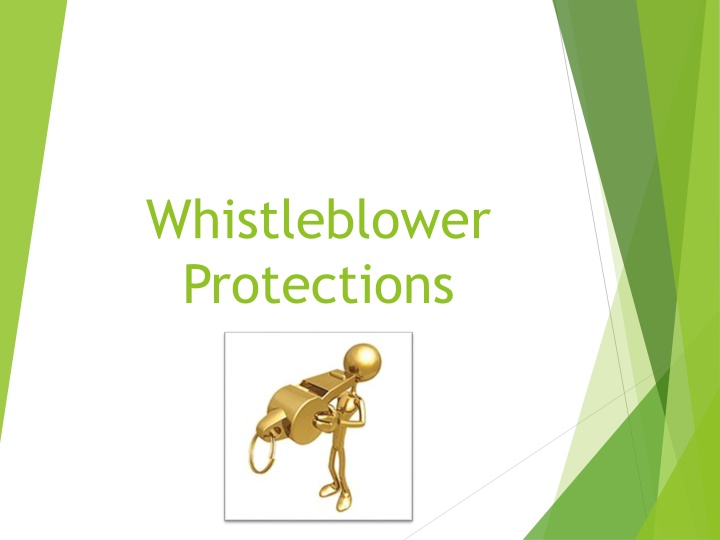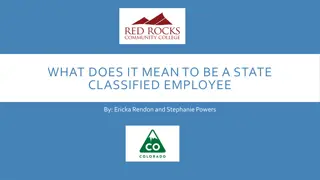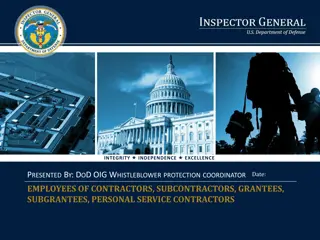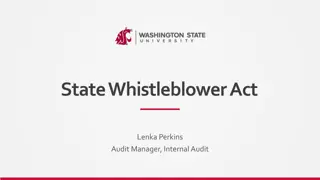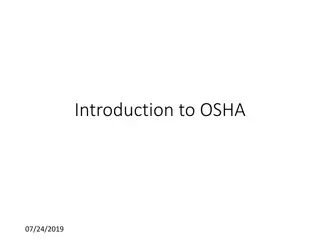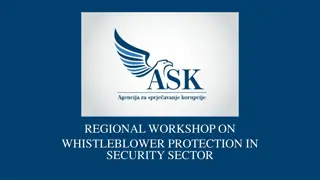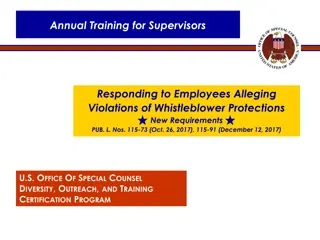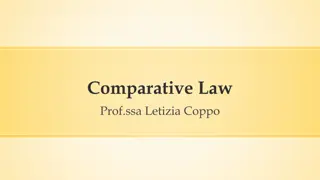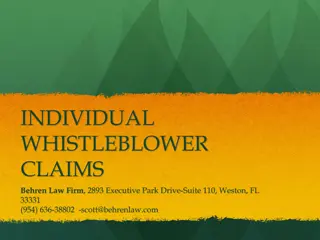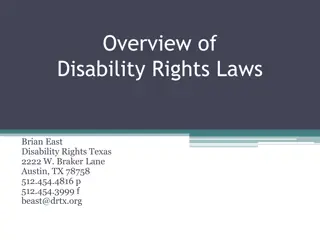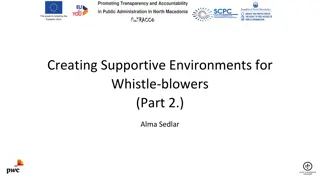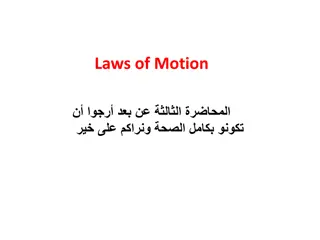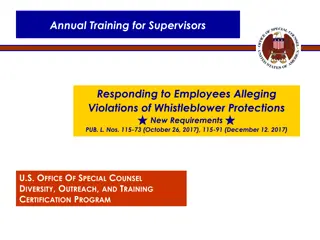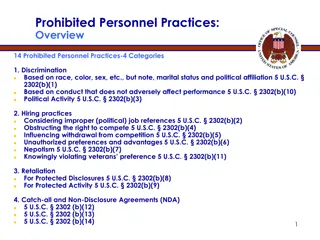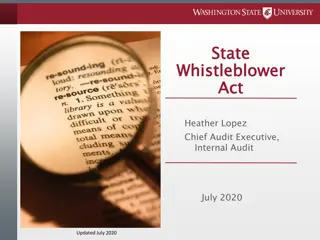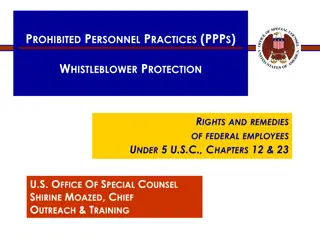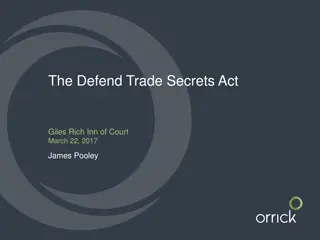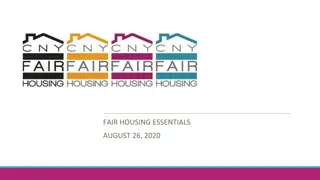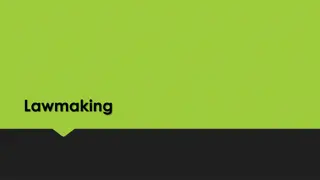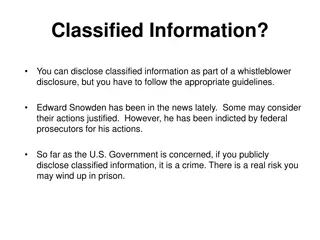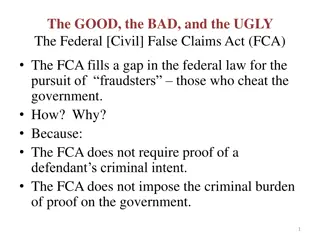Whistleblower Protections in Federal and State Laws
Whistleblower protections are vital for individuals who expose misconduct or illegal activities within an organization. Federal and state laws provide safeguards against retaliation for whistleblowers, ensuring they are protected and entitled to relief if they face discrimination. The Federal False Claims Act and various state laws specifically address whistleblower protections, offering avenues for reporting and seeking redress. Understanding these laws is crucial for upholding transparency and accountability in workplaces.
Download Presentation

Please find below an Image/Link to download the presentation.
The content on the website is provided AS IS for your information and personal use only. It may not be sold, licensed, or shared on other websites without obtaining consent from the author.If you encounter any issues during the download, it is possible that the publisher has removed the file from their server.
You are allowed to download the files provided on this website for personal or commercial use, subject to the condition that they are used lawfully. All files are the property of their respective owners.
The content on the website is provided AS IS for your information and personal use only. It may not be sold, licensed, or shared on other websites without obtaining consent from the author.
E N D
Presentation Transcript
Whistleblower Protections
Whistleblower Definition A whistleblower exposes misconduct, fraudulent or illegal activity in an organization Whistleblowers can be employees, suppliers, contractors, clients or any individual who becomes aware of illegal activities Any individual who chooses to become a whistleblower is protected under federal and state laws and hospital policy
Whistleblower Protections Federal law prohibits an employer from discriminating against an employee in the terms or conditions of his or her employment because the employee initiated or otherwise assisted in a false claims action. The employee is entitled to all relief necessary to make the employee whole. False Claims Act (FCA) liability extends to any conspiracy to violate any requirement of the FCA like retaliation against whistleblowers, which is against the law. The whistleblower employment discrimination protection has extended to employees, contractors and agents engaged in any other efforts to stop a violation of the FCA . With the implementation of the Federal Enforcement and Recovery Act (FERA) of 2009, there are new procedural provisions that allow the government to intervene beyond the statute of limitations in an existing qui tam suit by amending a complaint with new allegations.
Whistleblower Laws Below are the federal and state laws that discuss whistleblower protections Federal False Claims Act (31 USC 3730(h)) New York State False Claims Act (State Finance Law 191) New York State Labor Law, Section 740 New York State Labor Law, Section 741 These laws prohibit Crouse from intimidating, retaliating or discriminating against any employee that reports suspected non- compliance
Federal False Claims Act (31 USC 3730 (h)) This section allows individuals to initiate a suit in the name of the United States against individuals and organizations which they believe have defrauded federal government programs. Significant financial rewards can be obtained when the allegations are resolved by settlement or litigation. Any current or former employee, contractor or agent who is discharged, demoted, harassed, or in any other manner discriminated against in the terms and conditions of employment by their employer because of lawful acts in furtherance of a qui tam action, including investigation for, initiation of, testimony for, or assistance in a qui tam action filed or to be filed . . . , shall be entitled to all relief necessary to make the employee whole. Relief shall include reinstatement with the same seniority status that employee, contractor, or agent would have had, 2 times the amount of back pay, interest on the back pay, and compensation for any special damages sustained as a result of the discrimination, including litigation costs and reasonable attorneys fees.
NYS Whistleblower Laws NY False Claim Act (State Finance Law 191) Also provides protections and remedies to good faith qui tam relators. NY Labor Laws 740 & 741 Provides for protections from retaliatory action and remedies to an employee who in good faith, alleges an employer is in violation of a law constituting health care fraud. Protections are only available if the employee first brought up the matter with a supervisor and gave the employer a reasonable opportunity to correct the alleged violation.
Whistleblower Policies Refer to Crouse s policies for additional information Whistleblower: Compliance Reporting (P0174) Non-Intimidation & Non-Retaliation (P0170) Compliance: Federal and State False Claims Acts (P0079) Go to Crouse Insider Page Hospital Documents Policies and Procedures
Reporting Concerns If you have any concerns of suspected or actual violations you can report them by doing one of the following: 1. Notifying a superior 2. Calling the Compliance Officer at 470-7477 or by scheduling an in-person meeting 3. Calling the Anonymous Compliance Hotline (470-7770) 4. Submitting the Anonymous Compliance Form found on the Crouse Insider page Corporate Compliance
References Retaliatory Discrimination Actions Under the Whistleblower Protection Provision of the Federal False Claims Act, 31 U.S.C. 3730(H) . Arent Fox, January 2000. Retrieved from http://www.arentfox.com/newsroom/alerts/retaliatory-discrimination- actions-under-whistleblower-protection-provision-federal#.Vqt4Z5orKM- Summary of Federal and New York State Laws Relating to Filing False Claims Schofield Care, accessed January 27, 2016. Retrieved from http://www.schofieldcare.org/documents/hippa/schofield_summary_of _false_claims.pdf Whistleblower Protection . Nolan Auerbach & White, 2016. Retrieved from http://www.whistleblowerfirm.com/what-we-do/whistleblower- protection/
